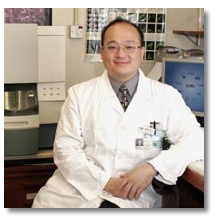Kin-Mang LAU (劉建盟)
BSc., MPhil., PhD.kmlau@cuhk.edu.hk
Dr. Lau is an Assistant Professor in Department of Anatomical and Cellular Pathology. He graduated from University of Hong Kong and received his Master degree in the Chinese University of Hong Kong. He got further trainings in cancer research in USA in Kimmel Cancer Institute, Pennsylvania and Tuft University, Massachusetts and pursued his PhD to study hormonal carcinogenesis of prostate and ovarian cancers in University of Massachusetts Medical School at Worcester, Massachusetts. After he went back HK, he took the position as Medical Scientific Officer in Hospital Authority to provide Molecular Haematology Diagnostic services in Prince of Wales Hospital and conduct biomedical researches in Haematology.
Currently, Dr. Lau’s research mainly focuses on hormonal carcinogenesis of urological cancers. As well, he collaborates with department colleagues to study other human cancers and diseases.
Research interests:
Characterization of phytoestrogens and synthetic estrogen-like compounds in prostate cancer
Characterization of antiestrogens and selective estrogen receptor modulators in prostate cancer
Characterization of nuclear and membranous estrogen receptors in prostate cancer
Establishment of Chinese prostate cancer cell lines
Identifications of genetic susceptible and resistance genes in prostate cancer
Studies of regulatory immune systems involved in escaping tumor immunosurveillance in nasopharyneal carcinoma
Immunogenetic studies of various human infectious diseases and malignancies
Decoding medulloblastoma genomes to identify putative tumor suppressor genes and oncogenes in this paediatric cancer
Publications
Lau KM, Cheng SH, Lo KW, Lee SA, Woo JK, van Hasselt CA, Lee SP, Rickinson AB, Ng MH. Increase in circulating Foxp3+CD4+CD25(high) regulatory T cells in nasopharyngeal carcinoma patients. Br J Cancer. 96(4):617-22, 2007.
Leung YK, Gao Y, Lau KM, Zhang X, Ho SM. ICI 182,780-regulated gene expression in DU145 prostate cancer cells is mediated by estrogen receptor-beta/NFkappaB crosstalk. Neoplasia. 8(4):242-9, 2006.
Leung YK, Lau KM, Mobley J, Jiang Z, Ho SM. Overexpression of cytochrome P450 1A1 and its novel spliced variant in ovarian cancer cells: alternative subcellular enzyme compartmentation may contribute to carcinogenesis. Cancer Res. 65(9):3726-34, 2005.
Mobley JA, Lam YW, Lau KM, Pais VM, L'Esperance JO, Steadman B, Fuster LM, Blute RD, Taplin ME, Ho SM. Monitoring the serological proteome: the latest modality in prostate cancer detection. J Urol. 172(1):331-7, 2004.
Lau KM, Tam NN, Thompson C, Cheng RY, Leung YK, Ho SM. Age-associated changes in histology and gene-expression profile in the rat ventral prostate. Lab Invest. 83(5):743-57, 2003.
Ho SM, Lau KM. DNA microarrays in prostate cancer. Curr Urol Rep. 3(1):53-60, 2002. Review.
Adams JY, Leav I, Lau KM, Ho SM, Pflueger SM. Expression of estrogen receptor beta in the fetal, neonatal, and prepubertal human prostate. Prostate. 52(1):69-81, 2002.
Leav I, Lau KM, Adams JY, McNeal JE, Taplin ME, Wang J, Singh H, Ho SM. Comparative studies of the estrogen receptors beta and alpha and the androgen receptor in normal human prostate glands, dysplasia, and in primary and metastatic carcinoma. Am J Pathol. 159(1):79-92, 2001.
Lau KM, LaSpina M, Long J, Ho SM. Expression of estrogen receptor (ER)-alpha and ER-beta in normal and malignant prostatic epithelial cells: regulation by methylation and involvement in growth regulation. Cancer Res. 15;60(12):3175-82, 2000.
Lau KM, Mok SC, Ho SM. Expression of human estrogen receptor-alpha and -beta, progesterone receptor, and androgen receptor mRNA in normal and malignant ovarian epithelial cells. Proc Natl Acad Sci U S A. 11;96(10):5722-7, 1999.